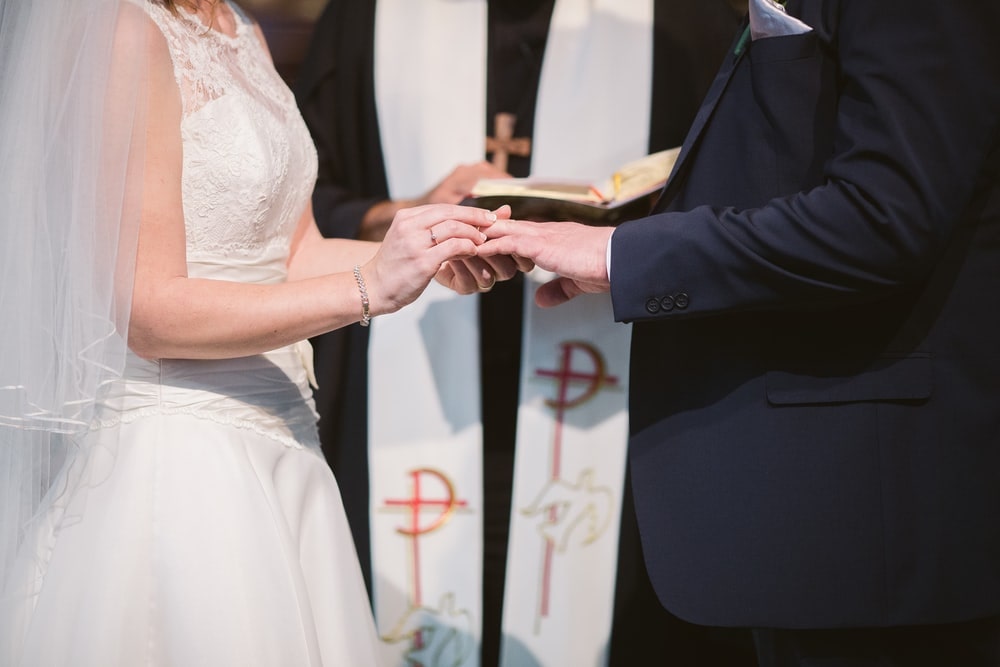In my previous article “New marriage through the Pauline Privilege“, I explained about the Pauline Privilege and dissolution of marital bond of two unbaptized persons in favor of the faith of the one intending to be baptized. In the current article, I will be talking about the further details on the Pauline Privilege, and how they are understood in its application.
Conditions for the Pauline Privilege to be applied
Conditions for the application of the Pauline Privilege are laid down under the following points:
- It is a marriage between two non-baptized persons. it means that at the time of marriage, both parties were unbaptized.
- There is a subsequent baptism of one and only one of the spouses, while the other spouse continues to remain a non-baptized party.
- There is a «departure» of the still non-baptized party as intended in can. 1143 §2. «Departure» understood here is not to necessarily only mean that the unbaptized spouse takes the initiative to effect a physical separation. Rather, it means as per the canon:
That the unbaptized party does not wish to cohabit with the baptized party. Or the unbaptized party, although wishing to cohabit, does not cohabit without affront/ offence to the Creator [= sine contumelia Creatoris].
- The baptized party should not be the one who gave a just cause for the unbaptized party to depart after his/ her baptism.
- If the baptized party gave the just cause to the other party to depart before the baptism, the Pauline privilege can be applied «since it has been blotted out by the bath of regeneration» (cf. 1Cor 7,12-15). However, if s/he gave the just cause to the other party to depart after the baptism, Pauline Privilege cannot be applied. For example, after baptism if it is the baptized party who commits adultery or unjustly deserts the unbaptized spouse, then the Pauline Privilege cannot be applied.
Meaning of without affront to the Creator
What does the term «without affront or offence to the Creator» mean in concrete terms? In Latin, it is formulated as “sine contumelia Creatoris”.
In simple terms, it is the danger of sin for the baptized party or the children, as well as actions and situations contrary to the honesty of marriage. In all these cases of dishonesty which goes against the unity and indissolubility of the marriage (cf. can. 1056), the unbaptized spouse is considered to have departed. More specifically, if the unbaptized party is found in any of the following acts, it is considered «without affront to the Creator».
- The unbaptized party does not permit the baptized party to practice one’s own faith and obligations proper to the religion.
- The unbaptized party gets involved in dishonest conjugal life by means of having sexual relationship with a third party.
- The unbaptized party does not want to cohabit with the baptized party.
- The unbaptized party gets involved either in polygamy or polyandry sexual union.
- The unbaptized party demands for an unnatural sexual activity from the baptized party contrary to the Church’s teachings.
- The unbaptize party impedes the Christian education of the children etc.
In all the above instances, if found to be true, the person is said to be “without affront to the Creator” to cohabit peacefully.
Further clarifications on Pauline Privilege
We have already discussed about the fundamental notions of the Pauline Privilege in our previous article. It is important to remember that in the application of Pauline Privilege, the marriage has to have been celebrated between two non-baptized persons. Thereafter, one of them wants to get baptized. And finally, the non-baptized party departs.
- Therefore, if both the parties get baptized subsequently, we cannot apply Pauline Privilege.
- A subsequent baptism is not necessarily the reason of departure of the non-baptized party. This means, it is not necessary that the departure of the unbaptized party be prompted by the other’s actual or intended baptism.
- Moreover, the sequence in which the baptism of the one spouse and the departure of the other occur is not of critical importance.
- Thus, whether the departure of the unbaptized party occurs before or after the baptism of the other spouse, the newly baptized party may use the privilege.
- Moreover, it is important to note that the subsequent baptism of one of the parties need not be in the Catholic Church. The following possibilities can be true:
It can be in the Catholic Church, or in the Ecclesial community not in full communion with the Catholic Church, or in the Church not in full communion with the Catholic Church, but baptism must be valid.
In order to ascertain the departure of the unbaptized party, “interpellation” is carried out. Let us understand what interpellation means.
Interpellation and its meaning
Interpellation of the non-baptized party is carried out before whether or not the departure takes place in the application of the Pauline Privilege. Primarily, “interpellation” means questioning the unbaptized party regarding his/ her opinion about the baptized party. Remember the following points:
- Who is interpellated? It is the non-baptized spouse who is interpellated.
- Why is interpellation done? To give a proof of his/her intention in the external forum so that through Pauline Privilege a new marriage can be validly entered into by the baptized party. This is to know if the unbaptized spouse has departed or not, in accordance with can. 1143 §2.
- Interpellation is a caution exercised by the Church in order to avoid any unforeseen discrepancies in the new marriage of the baptized party.
- Most importantly, the interpellations are required for the validity of the new marriage of the baptized party. This is important from the point of view of the ecclesiastical law. Hence from the interpellations, dispensation may be granted or even omitted as indicated in can. 1144 §2, if doing it was found to be useless or its outcome seem to be fruitless.
- The questions in the interpellations of the unbaptized party are two:
(1) If the unbaptized spouse wishes to get baptized. (2) At least, if the unbaptize spouse wishes to cohabit peacefully without affront to the Creator.
Who does the interpellation?
Interpellation is carried out by the following persons:
- It is done normally by the authority of the Local Ordinary of the spouse that has been baptized or is about to be baptized (in case of catechumen). This is for lawfulness only.
- The interpellated spouse can seek a time period before which he/ she would answer the questions. But he/ she needs to be told that after the lapse of such time period, his/ her responses will be presumed negative to both questions.
- The Local Ordinary can conduct the interpellation personally or through a delegate. The facts of interpellation as well as the result must be established in the external forum subject to procedural norms in the tribunals. It can be done through documentary tools or witnesses, or any other means.
- The baptized party also can privately do it which is valid. Even here, the facts of interpellation as well as the results must be established in the external forum.
Timing or sequence of interpellation
There can be two possible sequences of interpellation – before baptism, and after baptism. We shall understand this from examples.
- Interpellation before Baptism:
Supposing for example Ismael and Sara are two Muslims who got married. Sara wants to be baptized. Ismael does not want to cohabit with Sara. For Sara, there is the possibility to use the provision of the Pauline Privilege, so she wants to use it. Interpellation is done on Ismael. Ismael is firm in his decision not wanting to cohabit with Sara. Now, Sara can enter a new marriage with the third party validly. In this case, interpellation is required for the validity of the new marriage. When she contracts a new marriage, the marriage between Ismael and her is dissolved ipso iure, i.e., the dissolution of prior marital bond by the disposition of law itself.
- Interpellation after baptism: Interpellation of the unbaptized party can be carried out even after the baptism of the believer with equal effect as in the case of that of the before baptism. It can be done before baptism. However for the interpellation to be done after baptism, permission from the local Ordinary is a must. He can grant the permission for a grave cause/ reason.
Example: Rajkumar and Meenakshi both are Hindus, and get married according to their religious custom. Their marriage failed. Now, Rajkumar wants to be baptized in the Catholic Church, so he enrolls as a catechumen. Rajkumar wants to marry Annalisa, a Protestant. Rajkumar and Annalisa both are already living together. In this case, interpellation is permitted to be done before the baptism of Rajkumar so to avoid his living in sin after baptism. In this manner, after baptism, he can marry Annalisa validly, and with the new marriage, the prior marital bond with Meenkshi will be dissolved ipso iure. The new marriage takes place in the same ceremony of baptism. However, conditions are to be met as per disposition of can. 1147.
In case of successive polygamy to whom is the interpellation made?: The question arises, supposing the unbaptized party had more than one marriage either in the civil forum or marriage according to any other religious ceremony. Let us understand it through an example: Isaac and Sayema get married according to Muslim religious ceremony. Both are non-baptized. They get divorced. Isaac now marries Anjali a Hindu. Both are non-baptized. Isaac now gets baptized. Falls in love with Jesica, a Catholic. Both want to get married. Who is to be interpellated, first or second wife of Isaac? It is to be remembered that always the first wife is to be interpellated. However, in such cases, most often, the interpellation is dispensed from.
Dispensation from interpellation
What is dispensation? According to canon law, a dispensation is the relaxation of a merely ecclesiastical law in a particular case (cf. can. 85). Dispensation can be granted (within the limits of their competence) by those who have executive power, and by those who either explicitly or implicitly have the power of dispensing whether by virtue of law itself or by delegation.
Hence, interpellation can be dispensed as per canon law. This is also required for the validity of the Pauline Privilege. The dispensation from the interpellation regards both before or after the marriage provided it is evident from the extrajudicial process that under some specific circumstances or conditions, interpellation is not possible. Possible reasons for the dispensation from interpellation are:
- We do not know where the unbaptized party is.
- The unbaptized party is living in a place to which there is no easy access. In other words, it is difficult to reach there.
- The unbaptized party is living in the state of confinement or sequestrated to which there is no easy access.
- The unbaptized party refuses to be interrogated.
- Incapacity of the unbaptized party to respond to the one doing interpellation because of mental sickness.
- Danger of revenge from the part of the unbaptized party. Supposing the baptized party was threatened for deserting the unbaptized spouse before baptism, therefore, interpellation might provoke a revenge at the prospect of a new marriage.
- Interpellation is avoided when «it is evident that there is no useful result to do interpellation».
- Another reason to avoid doing interpellation can be if the other party to be interpellated is already married and happily married with kids.
Possible responses to the interpellation
We have already seen that in interpellation, the non-baptized is interrogated concerning two specific questions, whether:
- He/ she also wishes to receive baptism.
- He/ she, at least is willing to live peacefully with the baptized party without affront to the Creator.
There can be three hypotheses surrounding the Pauline Privilege cases concerning above mentioned interpellations:
- The non-baptized also gets baptized, then the indissolubility is confirmed and strengthened. The natural marriage becomes a sacrament.
- The non-baptized does not get baptized, but accepts to live peacefully, indissolubility remains.
- The non-baptized neither gets baptized nor accepts to peacefully cohabit, and departs. The marriage is dissolved ipso iure (by the very disposition of law itself) the moment the baptized party enters into new marriage, without having to obtain any dispensation.
Based on the the three hypotheses, possible responses can be the following and the corresponding canonical implications:
First response: The unbaptized party responds negatively to both the questions. He/ she neither wants to be baptized nor wishes to live peacefully without affront to the Creator. In this case, the baptized party can go ahead with the new marriage provided it is clear that it is not the baptized party who has given a just reason for the non-baptized party to depart.
Second response: The unbaptized party responds affirmatively to both the questions. He/ she wants to get baptized and also wants to live peacefully. In this case, no new marriage can be entered into by the baptized party, even if it was the unbaptized party who departed for an unjust cause. Suppose, if the baptized party does not want to reconcile with the unbaptized party. As result, the baptized party can remain in separation while the bond remains.
Third response: If the unbaptized party answers in sincere affirmative to the interpellations, but it is de facto impossible to restore conjugal cohabitation owing to distance, imprisonment, confinement or some other circumstances. In such cases, the unbaptized party is considered to have departed, and the baptized spouse may enter a new marriage after baptism. This is just an opinion. In general, this is not the canonical praxis.
Fourth response: If the unbaptized party responds negatively to baptism but positively to peaceful cohabitation. Then there is no application of the Pauline Privilege. However, if in the initial phase, the unbaptized spouse accepts peaceful resumed cohabitation and thereafter breaks the promise, that is, leaves without a just cause. In such case, the situation does not let forfeit the baptized spouse his/ her right to separate from the latter and enter a new marriage, no matter how long the resumed cohabitation has got protracted in time. But interpellations are to be conducted before entering into a new marriage.
Fifth response: If the unbaptized spouse responds positively to baptism but negatively to peaceful cohabitation without affront to the Creator. We need to consider carefully the refusal to resume cohabitation under following points:
- If the refusal is for reasons, legitimate or illegitimate, unrelated to any culpable conduct on the part of the baptized spouse, the baptized party may enter a new marriage.
- If the refusal of the unbaptized party stems from an illegitimate post-baptismal conduct, the baptized party cannot enter a new marriage.
- If the refusal of the unbaptized party arises from a pre-baptismal conduct, the baptized party can enter a new marriage. In this case, care must be taken that the marriage takes place before the other spouse is baptized. Otherwise, the baptism of the other [unbaptized] spouse will make the marriage ratified but not consummated, and therefore one to which the Pauline Privilege is not applicable.
Juridical consequences of the unbaptized party
So far, we have spoken about the baptized party and his/ her right to get married newly. But what happens to the unbaptized party? What are other possibilities left for him/ her? There can be at least three juridical consequences for the unbaptized party:
- Since the new marriage dissolves the prior bond [the new marriage dispenses from the prior marital bond], the unbaptized party is free to remarry with anyone he/ she may like.
- The unbaptized party can enter into a new marriage with anyone, baptized or non-baptized. The new marriage of the unbaptized party will be presumed valid if the new marriage takes place after the baptized spouse’s new marriage. Why? If it takes place before the baptized spouse’s marriage, then it will be invalid because of the impediment of the prior bond with the baptized party.
- If the unbaptized party had a civil union with a Catholic, this can be convalidated after the dispensation from disparity of cult.
Juridical consequences of the baptized party
Evidently, the baptized party enjoys the right and privilege of the canonical disposition of the Pauline Privilege. In gist, it follows that:
- The baptized party has the right to enter a new marriage with a Catholic (baptized in the Catholic Church or received into it after baptism).
- The above provision is of ecclesiastical law, hence it can be dispensed from.
- Consequently, the baptized party can marry accordingly with a baptized non-Catholic (in which case, the norms of the mixed marriage will apply that includes permission from the Local Ordinary. If dispensation from canonical form [forma canonica] is granted, a public form of celebration is must). At the same time, the baptized party can marry with a non-baptized person (in which case, dispensation from disparity of cult is to be obtained. If dispenstion from canonical form [forma canonica] is grated, a public form of celebration is a must).
Conclusion
The disposition of the Pauline Privilege is a privilege and not a right. But can. 1146 speaks of the right of the baptized party to contract a new marriage with the Catholic party. What does this right mean? This right means that there are sufficient conditions for the realization of Pauline Privilege to be applicable. The right refers to the applicability of Pauline Privilege.
The entire application of the Pauline Privilege and the exception on the indissolubility of marriage that the Church teaches must be looked at from the perspective of salus animarum, the “salvation of souls” (cf. can. 1752) which is the supreme law of the Church.




